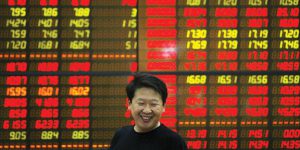Bloomberg
A move by the world’s largest sovereign wealth fund to snub a Chinese apparel firm and growing concern that surging oil prices will complicate policy makers’ easing path sparked fresh pessimism over Chinese and Hong Kong’s stocks.
Stock benchmarks in China and Hong Kong both tumbled by more than 3% before paring losses sharply. The CSI 300 closed down for a sixth day in its the longest losing streak since March 2020. The Hang Seng Index is set for its worst week in two years, dragged lower by Li Ning Co and Hong Kong Exchanges & Clearing Ltd.
Norway’s $1.3 trillion sovereign wealth fund announced it was excluding Li Ning due to the risk that the sportswear maker contributes to serious human rights violations in Xinjiang, fuelling worries about a potential retreat of other long-term investors. The stock plunged more than 11%.
“Norway sovereign fund’s offloading Li Ning is triggering some worries about the attitude over Chinese and Hong Kong stocks in the future,†said Castor Pang, head of research at Core Pacific Yamaichi.
The dramatic fall on Wednesday reminded traders of the market swoons in 2018 — during which mainland shares lost about a quarter of their value — triggered by the Sino-US trade war.
Analysts also attributed the slump to a variety of reasons including fears more Chinese firms could be sanctioned
due to their ties with Russia, rising virus cases in China, higher-than-expected inflation print and volatility caused by algo-driven trading on the mainland.
The producer price index rose 8.8% from a year earlier, compared with estimates of 8.6%, official data showed on Wednesday. Economists at Goldman Sachs Group Inc. expected China’s economy to grow only 4.5% this year, a full percentage point below the gross domestic product target of about 5.5% set last week. Meanwhile Covid infections in China topped 500 for a third consecutive day on Wednesday, with cases rising in major cities such as Beijing and Shanghai.
“A lot of factors at play here: Covid hitting highs in China, inflation coming in higher than expected, and news overnight that China may be considering investing in Russian assets. This increases the risks of a global response against China,†Bloomberg Intelligence Strategist Marvin Chen said.
Cracks are also showing up in China’s bond market. Yields on the 10-year sovereign note rose to 2.86%, the highest this year, as Commerzbank AG economist Hao Zhou pointed to capital outflows.
 The Gulf Time Newspaper One of the finest business newspapers in the UAE brought to you by our professional writers and editors.
The Gulf Time Newspaper One of the finest business newspapers in the UAE brought to you by our professional writers and editors.
